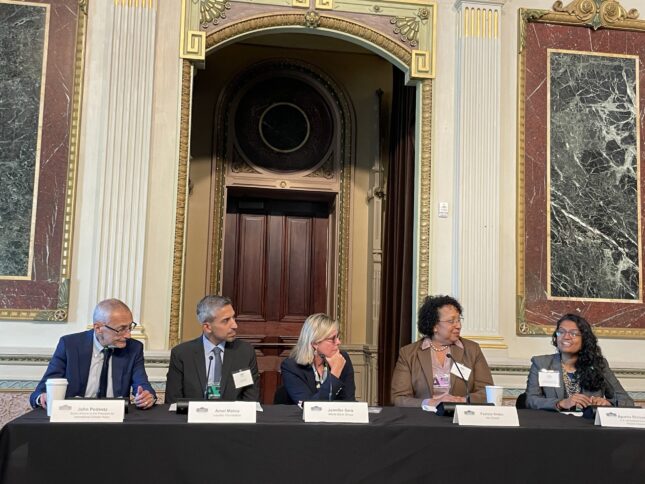-
The Arc | Inclusive Green Energy: Accelerating Just Transitions
December 13, 2024 By Wilson Center Staff In today’s episode of The Arc, we are featuring a panel discussion on how to accelerate just energy transitions around the globe from the Forum on Advancing Inclusive Climate Action in Foreign Policy and Development, hosted by the Wilson Center in collaboration with the White House and USAID’s Bureau for Humanitarian Assistance, with support from the USAID Climate Adaptation Support Activity.
In today’s episode of The Arc, we are featuring a panel discussion on how to accelerate just energy transitions around the globe from the Forum on Advancing Inclusive Climate Action in Foreign Policy and Development, hosted by the Wilson Center in collaboration with the White House and USAID’s Bureau for Humanitarian Assistance, with support from the USAID Climate Adaptation Support Activity.In today’s episode of The Arc, we are featuring a panel discussion on how to accelerate just energy transitions around the globe from the Forum on Advancing Inclusive Climate Action in Foreign Policy and Development, hosted by the Wilson Center in collaboration with the White House and USAID’s Bureau for Humanitarian Assistance, with support from the USAID Climate Adaptation Support Activity. You will hear from the panel’s moderator, John Podesta, Senior Advisor to the President for International Climate Policy, and from expert panelists including Amol Mehra, Director of Industry Programmes, Laudes Foundation; Jennifer Sara, Global Director, Climate Change Group, World Bank Group; Patricia Shako, Director, Caribbean RESET, Abt Global; and Aparna Shrivastava, Acting Chief Climate Officer, US International Development Finance Corporation. Select quotes are featured below:
On engaging local communities in the just energy transition
Amol Mehra: Out of the over 600 initiatives that called themselves just transitions, only about 200 of the 600 had any element of gender inclusion or gender sensitivity. What was on the positive side was that many of those looked at indigenous peoples and other types of issues outside of a focus simply on workers.
But I think what we learned was that there were three paradigms of what just could mean. First was an idea of inclusion. Are workers and communities at the table? Second was the idea of agency. While they were at the table, did they have the ability to influence outcomes to shape decisions? And the third was accountability: Were workers and communities able to hold governments and industry accountable for their commitments along that transition?
On how the World Bank is engages local communities
Jennifer Sara: You have to bring communities and stakeholders in at different levels to unpack it. So, the Comati was one specific investment by the World Bank, and that’s where we brought in communities that are directly benefited by the project.
And I think it’s important for us all to work together from the bottom up. And we talk a lot about the importance of trust and transparency in global carbon markets, and it comes down to the environmental and social integrity of the credits. And that’s where I think it’s important to bring in communities, NGOs, and governments.
We need to think about benefit-sharing schemes, if there is going to be some kind of emissions reduction payment or some kind of credit, and who owns these carbon emissions. That’s an important conversation to engage communities in. We do have some processes in place to bring in the voice of indigenous peoples, and it’s been very interesting because, all of a sudden, their inclusion tackles all kinds of issues like land rights that go way beyond the notion of “let’s protect our forests.”
On engaging “large ocean states” in the energy transition
Patricia Shako: We’ve seen a lot of change in the small island developing states, or as I prefer to call them, large ocean states.
I am currently, through AptGlobal, heading up a USAID-funded program that’s touching down in 11 countries in the Caribbean to build capacity at the government level, build capacity in the private sector, and build community capacity to make decisions that are inclusive.
One of the important things to think about is what does a green transition look like in terms of jobs? That is a language that most households understand. What are the implications for communities in terms of their access to power? Living on an island, it is difficult to look at things like transit and transmission of energy, especially green energy.
On the Development Finance Corporation’s engagement with local communities
Aparna Shrivastava: The majority of what we hear when we think about climate investments and climate finance opportunities is some pitch for an opportunity for folks in the global north to make sound investments somewhere in the global south. And while that might be the case, it’s also critical to think about how we can ensure these economic opportunities and investments are also benefiting the communities that, historically, have primarily been on the receiving end of these sorts of policies rather than actually being a part of the table and the conversation.
So, when we’re thinking about climate at DFC, we recognize that the climate crisis is basically generating opportunities in nearly every sector of the economy, including energy, infrastructure, health, agribusiness, small businesses, and financial services. And that means that there’s a tremendous opportunity to positively impact receiving communities.
On uniting investments in climate and justice
Amol Mehra: For too long, on the one hand, we had corporate commitments on social sustainability and human rights, and on the other hand, we had a decarbonization agenda. We should take accountability for promoting those two things as distinct. And I think the learning for all of us is especially with the emergence of extreme weather events and understanding how global supply chains and corporate businesses are impacted by these harms. We need to start seeing these two as merged.
On opportunities to scale different climate finance options
Patricia Shako: One of the things that we are seeing in the Caribbean Seychelles is the first debt for nature swap. Now we have also seen debt swaps in Barbados and Belize looking at conservation of oceans. These transactions are expensive, and even though they are locally driven and depend on local knowledge, they still need to quantify the benefits.
A lot of the systems that are in place now are not used to the quantification of natural benefits. Systems are not geared to deal with that, but one of the other things that was mentioned is the role of derisking and ensuring that the private sector can come to the table assured that they will have a way to recoup their investment if there’s a natural disaster, if there’s an impact that affects their investment. And that is an important part of financing these projects.
On facilitating the flow of climate finance through local currency lending
Aparna Shrivastava: One area that’s crucial for ensuring just transitions is financing. Climate finance needs to flow in an inclusive manner to ensure local currency lending. So, if you have a small business, let’s say in India, that is selling solar home systems that are making their profits in Indian rupees.
They are going to have a really hard time signing up for a loan with a long tenor where the expectation is to pay back in US dollars, given the potential risks around currency fluctuation and potential devaluation of the rupee. Here, the DFC has received authority to provide local currency lending. We’ve been able to commit a handful of transactions, and we’re eager to grow this type of lending practice
Photo credit: Wilson Center Staff
Topics: adaptation, backdraft, behavior change, climate change, community-based, decarbonization, energy, environmental justice, foreign policy, humanitarian, Indigenous Peoples, international environmental governance, just energy transition, livelihoods, meta, nature-based solution, The Arc (Podcast Series)
 A Publication of the Stimson Center.
A Publication of the Stimson Center.

 In today’s episode of The Arc, we are featuring a panel discussion on how to accelerate just energy transitions around the globe from the Forum on Advancing Inclusive Climate Action in Foreign Policy and Development, hosted by the Wilson Center in collaboration with the White House and USAID’s Bureau for Humanitarian Assistance, with support from the USAID Climate Adaptation Support Activity.
In today’s episode of The Arc, we are featuring a panel discussion on how to accelerate just energy transitions around the globe from the Forum on Advancing Inclusive Climate Action in Foreign Policy and Development, hosted by the Wilson Center in collaboration with the White House and USAID’s Bureau for Humanitarian Assistance, with support from the USAID Climate Adaptation Support Activity.





